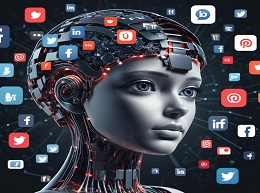Analyzing the Impact of AI on Social Media Algorithms

In today's digital age, social media platforms serve as the cornerstone of online interaction, connecting billions of users worldwide. Behind the scenes, artificial intelligence (AI) plays a pivotal role in shaping the content we see on these platforms. This article delves into the intricate relationship between AI and social media algorithms, analyzing their impact on content visibility, user engagement, and the broader digital landscape.
Understanding Social Media Algorithms
The Role of Algorithms in Content Curation
Social media algorithms are complex mathematical formulas designed to curate and prioritize content based on various factors, including user preferences, engagement metrics, and platform objectives. These algorithms dictate what content appears on users' feeds, influencing their browsing experience and interaction with the platform.
The Evolution of AI in Algorithmic Decision-Making
AI algorithms have become integral components of social media platforms, continuously analyzing vast amounts of data to optimize content distribution and user engagement. Machine learning algorithms adapt and evolve over time, learning from user interactions and feedback to refine content recommendations and personalize user experiences.
Impact of AI on Content Visibility
Personalized Content Recommendations
AI-driven algorithms leverage user data and behavior patterns to deliver personalized content recommendations tailored to individual preferences and interests. Platforms like Facebook and Instagram use AI to analyze user interactions, including likes, comments, and shares, to surface relevant content on users' feeds, enhancing user engagement and satisfaction.
Filtering and Moderation
AI-powered content moderation tools help social media platforms identify and remove inappropriate or harmful content, such as hate speech, fake news, and graphic imagery. By utilizing machine learning algorithms, platforms can swiftly detect and address violations of community guidelines, ensuring a safer and more conducive online environment for users.
Influence on User Engagement
Enhanced User Experience
AI algorithms optimize user engagement by prioritizing content that is most likely to resonate with individual users, increasing the likelihood of likes, comments, and shares. Platforms like TikTok leverage AI-powered recommendation systems to deliver a continuous stream of entertaining and relevant content, captivating users and encouraging prolonged engagement.
Algorithmic Bias and Echo Chambers
Despite their benefits, AI-driven social media algorithms are susceptible to bias and the formation of echo chambers. Algorithms may inadvertently reinforce users' existing beliefs and preferences, leading to filter bubbles and polarization of viewpoints. Addressing algorithmic bias and promoting diverse perspectives remains a significant challenge for social media platforms.
Future Trends and Considerations
Transparency and Accountability
As AI continues to shape social media algorithms, ensuring transparency and accountability in algorithmic decision-making is paramount. Users and regulators demand greater transparency into how algorithms work and the factors influencing content visibility, highlighting the importance of ethical AI practices and algorithmic accountability.
Regulatory Scrutiny
The growing influence of AI on social media algorithms has prompted increased regulatory scrutiny and calls for greater oversight. Governments and regulatory bodies are exploring measures to address concerns related to algorithmic bias, misinformation, and data privacy, signaling a potential shift in the regulatory landscape for social media platforms.
Conclusion
AI-powered algorithms are driving profound changes in how content is curated, distributed, and consumed on social media platforms. From personalized content recommendations to automated content moderation, AI plays a central role in shaping user experiences and influencing online discourse. As AI technologies continue to evolve, social media platforms must navigate ethical considerations and regulatory challenges to ensure responsible and inclusive algorithmic practices. Ultimately, understanding the impact of AI on social media algorithms is essential for shaping a more transparent, accountable, and equitable digital ecosystem.